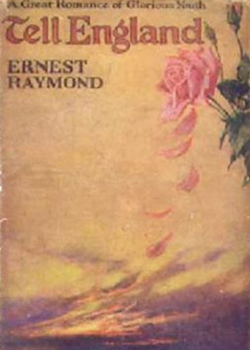'Tell England' by Ernest Raymond
- Home
- World War I Book Reviews
- 'Tell England' by Ernest Raymond

'Tell England,' by Ernest Raymond, is a deeply moving and thought-provoking novel that captures the essence of the First World War through the eyes of two young soldiers. Raymond's powerful storytelling, rich character development, and evocative prose make this a compelling read. Despite some pacing issues, the novel successfully conveys the toll of war on the human spirit and serves as a poignant reminder of those who fought; it is an enduring testament to courage, camaraderie, and the indomitable will to survive amidst the chaos of war.
This moving, though dated work, was first published in 1922, captures the raw emotions, struggles, and sacrifices that young, public schools boys faces in the Great War.
'Tell England' follows the lives of two boys, Tom and Clive, who are inspired by their schoolteacher (who they adore) to enlist. The novel follows their personal development as they grow from carefree, naive Edwardian schoolboys to hardened soldiers facing the harsh realities of war. Raymond captures the essence of the era, detailing the arduous training, soldier camaraderie, and the brutality and futility of warfare.
The characterisation in 'Tell England' is one of its strongest points. Tom and Clive are skillfully portrayed as multi-dimensional individuals, allowing readers to empathise with their hopes, fears, and the weight of their responsibilities. Raymond deftly delves into their psychological struggles, conflicting emotions, and gradual disillusionment with the glorified notions of war. He illuminates the toll that war takes on the human spirit through these characters, capturing the harrowing effects on their mental and emotional well-being.
Raymond's writing is evocative and immersive, conjuring up vivid images of battlegrounds and trenches. From the thunderous sounds of artillery fire to the unbearable stench of death, he vividly depicts the harsh realities of war. He explores the human condition, the loss of innocence, and the enduring spirit of resilience in the face of unspeakable horrors in his lyrical prose.
While 'Tell England' excels in many areas, there are times when the pacing slows, especially during the extensive descriptions of military training and the waiting periods between battles. Although these sections offer insight into the monotony and tension of wartime, they may test the patience of some readers seeking a more dynamic narrative.
It is also worth noting also that 'Tell England' focuses primarily on the experiences of young soldiers and their camaraderie, rather than providing a comprehensive analysis of the war itself. This approach, on the other hand, contributes to the novel's intimate and personal perspective, allowing readers to form a strong emotional connection with the characters.
For a further review by the novelist H S Ross in the Paris Review > Kiss the Rod





